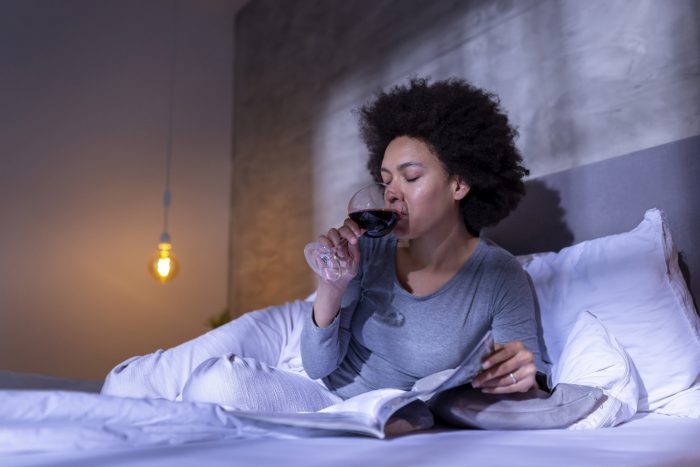Does Alcohol Help or Hurt Your Sleep?
September 3, 2021
Enjoy having a nightcap or two each evening before you head off to bed? Winding down with a serving of your go-to adult beverage may seem like a great way to de-stress after a long day. Many people even use alcohol as a sleep aid. But while alcohol can help you fall asleep faster, it actually disrupts the quality of sleep you experience. Let’s talk more about the relationship between sleep quality, alcohol, and sleep apnea.
How Alcohol Affects Sleep
Alcohol is a depressant, which means it can induce a feeling of relaxation and drowsiness. However, its sedative properties are deceptive because they interfere with the quality of sleep in a few different ways:
- Less REM sleep. Alcohol before bedtime can cause you to spend less time in REM sleep, which is the stage of the sleep cycle when you process memories and emotions.
- Circadian rhythm disruption. Your circadian rhythm regulates your body’s internal clock. Alcohol can interfere with that clock, causing you to wake up earlier in the morning.
- Frequent waking. You might find that you wake up more often during the night after you consume alcohol. It also increases the risk of sleep eating and sleepwalking.
Alcohol and Sleep Apnea
Alcohol before bedtime can be especially problematic for individuals who suffer from sleep apnea. Alcohol relaxes the body which also relaxes the muscles at the back of the throat. Not only does this increase the risk of snoring, but it also means that those same muscles that vibrate when you snore may block the upper airway altogether, leading to pauses in breathing (called apneas). For individuals who already suffer from apneas, alcohol only exacerbates the problem.
When Is It Okay to Drink Alcohol?
If you enjoy an occasional drink, you do not have to give up alcohol altogether. You can minimize the impact it has on your sleep by:
- Drinking earlier in the evening. Depending on your body weight and metabolism, it may take you about one hour to metabolize one serving of alcohol. If you have your last drink at least 3–4 hours before bedtime, you may sleep better.
- Drink less. You might find that cutting back on how much you drink—for example, having just one small glass of wine instead of two—helps you sleep better.
- Keep a sleep journal. By noting how much you drink, when you drink, and how it affects your sleep, you can establish a routine that works well for you and provides a good reference point if you notice changes in your sleep.
The moral of the story? Alcohol is more of a sleep hindrance than a sleep aid, but there are ways to enjoy it in moderation without interfering with the quality of your rest.
Meet the Author
Dr. Kenneth Mogell, a board-certified specialist in sleep medicine with over 10 years of experience treating sleep breathing disorders is the practice’s founder and primary practitioner. The practice has three South Florida locations: Melbourne, Vero Beach, and Boca Raton. To learn more about Florida Dental Sleep Disorders and Dr. Kenneth Mogell, contact our team at 844-294-7559.
